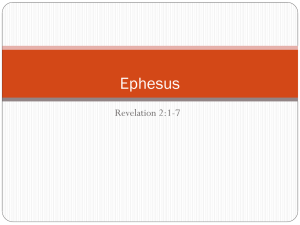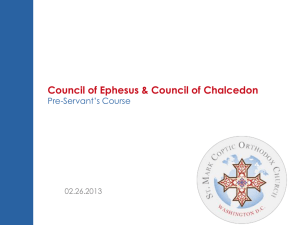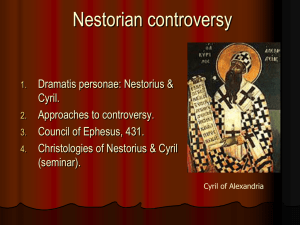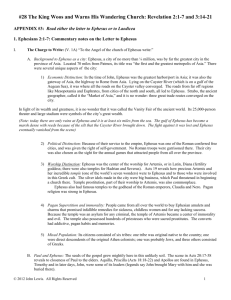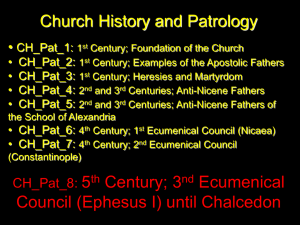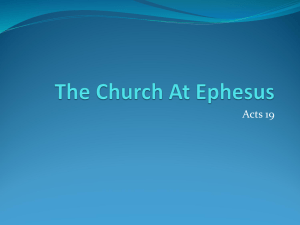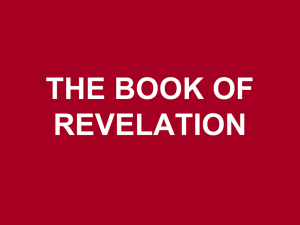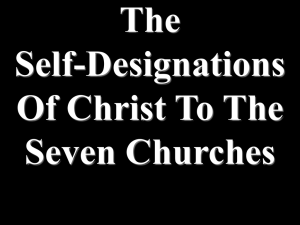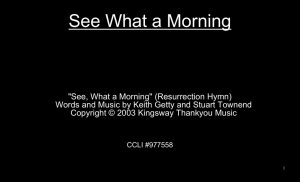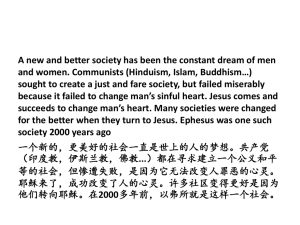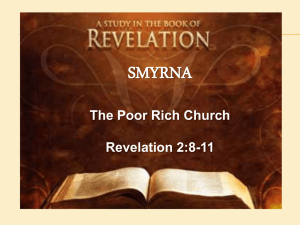Revelation2-Ephesus
advertisement
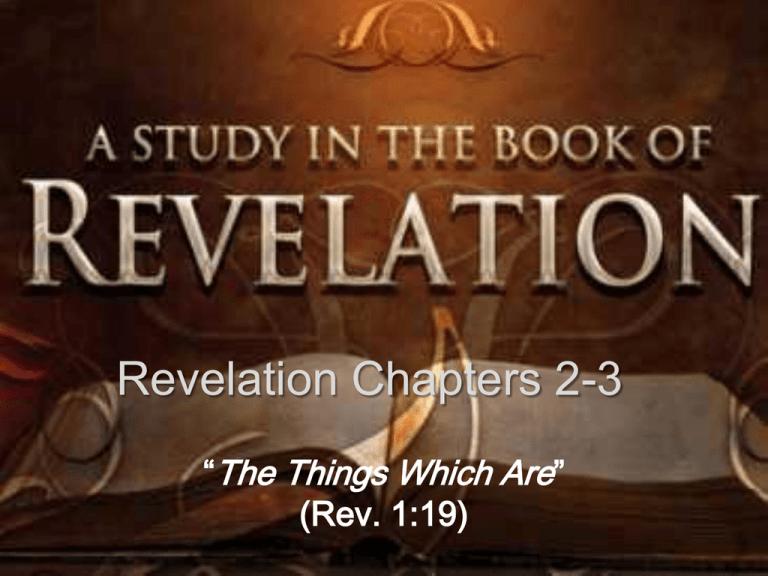
Revelation Chapters 2-3 “The Things Which Are” (Rev. 1:19) Christ to the Seven Churches of Asia Ephesus Smyrna Pergamos Thyatira Sardis Philadelphia Laodicea Rev. Rev. Rev. Rev. Rev. Rev. Rev. 2:1-7 2:8-11 2:12-17 2:18-29 3:1-6 3:7-13 3:14-22 EPHESUS ("Ephesus" means "desirable") BUSY BUT BACKSLIDDEN AND WITHOUT LOVE. Revelation 2:1-7 - Ephesus was an apostolic church of the First Century. - A was a prosperous Roman trade city located on the Aegean Sea. - Its business centered on worldwide sea trade due to its sheltered inland harbor. Today the city is but a ruin. - Heavy timbering and over grazing of land eroded its top soil which was carried into the Cayster River and deposited in the bay the city was built by. - Dredging failed to clear the waterways. - The river filled up the bay and it became a reed marsh. - Today the ruins of the city are 12 miles inland. The city that occupies the area today is the Turkish town called Ayasaluk. - The word “apostolic" relates to the Apostles. It refers to the first churches established by the Apostles. Ruins of the Church at Ephesus Artemis (Diana) of Ephesus Amphitheater Ephesus Temple of Artemis at Ephesus As it looked in Paul’s day Ephesus was in the beginning a spiritually strong church and Acts 20:31, records that Paul spent three years there teaching and preaching. - Timothy was pastor of Ephesus during Paul's imprisonment and martyrdom in Rome. Historians record that Timothy suffered at Ephesus the same martyrdom as Paul at Rome. - The Apostle John ministered at Ephesus later and was exiled from there to the Island of Patmos. there. - Polycarp, who was a disciple John also ministered - All but John were martyred. Problems in the Ephesus Church: - Satan's attacks and by the problem of the saved Gentiles who continued to walk after the world. (Eph. 5:2-17) - Ephesians 5:6 indicates there were those in the church who were teaching that sinning was all right with God. - John later opposed the false doctrines of Nestorius and Gnosticism who also plagued this church. - The city was located in the middle of pagan land. The idol goddess Diana's (Artemis) temple was there which was called one of Seven Wonders of the World. - When Paul first preached in Ephesus many people believed in Christ and sale of idols and pagan religious items dropped off. Those who made the idols, upset by the lost of business, caused the riot mentioned in Acts. 19:25-27. Letter is addressed to the church through its pastor. The word "angel" means "messenger." The word doesn't mean an angel as heavenly being, but it simply identifies one as the "messenger." The Greek literally says, "The messengers of the churches." It is important to note that the pastors derive their message from Christ. A church is ruled by Christ who is its Head and He brought it with His own blood. (Eph. 5:23, 25) The church that follows Christ will have no problem honoring and following God's messengers who faithfully preach the Word of God and follow the Lord. The pastor is to be the leader or overseer of the church as New Testament clearly states. He leads as a shepherd. Sheep must have a shepherd. He is not to be a lackey of the congregation, nor should he lord over the flock. (1 Tim. 1:18-19; 4:16,12; 5:20:22; 6:3-5,17; 2 Tim. 1:8, 13; 2:2-3, 14; 3:5; 4:1-5; 1 Peter 5:7) Many churches and pastors allow a group of deacons, trustees or committees to rule over a church. The point can be made here that God did not speak to any individual or group in the churches, but spoke directly to the pastor whom he had appointed as leader. The precedent is firmly established that He spoke to the church through their pastor that He through the Holy Spirit had set over the congregation. (Acts 20:28) FIRST: THE GOOD NEWS CHRIST COMMENDS THE EPHESIANS. (Rev. 2:2-3) "I know thy works, and thy labour, and thy patience, and how thou canst not bear them which are evil: and thou hast tried them which say they are apostles, and are not, and hast found them liars: And hast borne, and hast patience, and for my name’s sake hast laboured, and hast not fainted."(Rev. 2:2-3) Jesus says to this assembly that He knew of their deeds and hard labor for the Lord showing His personal attention to the affairs of His congregation. Works = good deeds, labor in the church. The term "hard labor" means to "toil, or strenuous exhausting effort." Patience = denotes they were enduring and not losing momentum. They refused to be defeated even though wickedness was all around. They did not tolerate evil men = Unbelief is evil and sin whether it be in a preacher, a church, an organization or people in general. This church abhorred evil and false teachers. False Apostles = The Lord is commending them for their uncompromising stand for the truth against false apostles who this church showed to be liars. Sums up their faithfulness: And hast borne, and hast patience, and for my name’s sake hast laboured, and hast not fainted." THE BAD NEWS: I HAVE SOMETHING AGAINST THEE. (Rev 2:4) Christ Himself admonished His church and literally says, "I hold this against thee.“ The chilling words! “you have forgotten your first love !" Look at yourself as I see you! You are too occupied with church pride, numbers, programs and routines. You should serve me out of love, not loyalty to an organization." Ephesus' failure was refusing to follow Paul's instruction to "Examine yourselves, whether ye be in the faith; prove your own selves." (2 Cor. 13:5) Outwardly, they may have prided themselves in their love. But it was an emotional love, not "agape" which manifests itself in total unselfish dependence on and devotion to Christ. The word used for "hast left" implies an intentional and not accidental act. REPENT! RETURN TO A SERVICE OF LOVE OR I WILL REMOVE YOUR CANDLESTICK. (Rev. 2:5) Colossians 1:18 says, ". . . that in all things he might have the preeminence. " The fatal error of the Jewish Scribes and Pharisees was that they were religious zealots outwardly making a show of keeping the letter of the law. Yet, inside in their hearts, Jesus said they were dead and described them as white washed tombs, beautiful on the outside but full of dead men's bones. (Matt. 23:27) Christ warns them say He will remove His power and blessing from a church that refuses to serve in truth and love. Playing church out of habit or tradition is not pleasing to the Lord. Christ warns He would leave their assembly and thereby would cease to recognize them as His church and provide not leadership for them. Jesus says He would remove their candlestick (pastor). Their God sent pastor would be removed “out of his place” meaning from that church. JESUS COMMENDS THEM BECAUSE THEY RIGHTLY OPPOSED THOSE TRYING TO SET UP A HIERARCHY IN THEIR CHURCH. (Rev. 2:6) The Nicolaitans were a heretical sect of people in this congregation. The word means, "Niko” to conquer and “Laos” the people. It means simply this: The Nicolaitan’s philosophy was that there was a difference between the "laity" (the people) and the clergy (the pastors). CHRIST SPEAKS TO HIS CHURCH. (Rev. 2:7) "He that hath an ear, let him hear what the Spirit saith unto the churches; To him that overcometh will I give to eat of the tree of life, which is in the midst of the paradise of God.” (Revelation 2:7) Ephesus did not hear and in time fell and became a part of the organized Papal type church. Because the love of Christ was not their motive for service their organization began to promulgate itself. It ceased to be Christ's church and became an apostate group without Christ.
